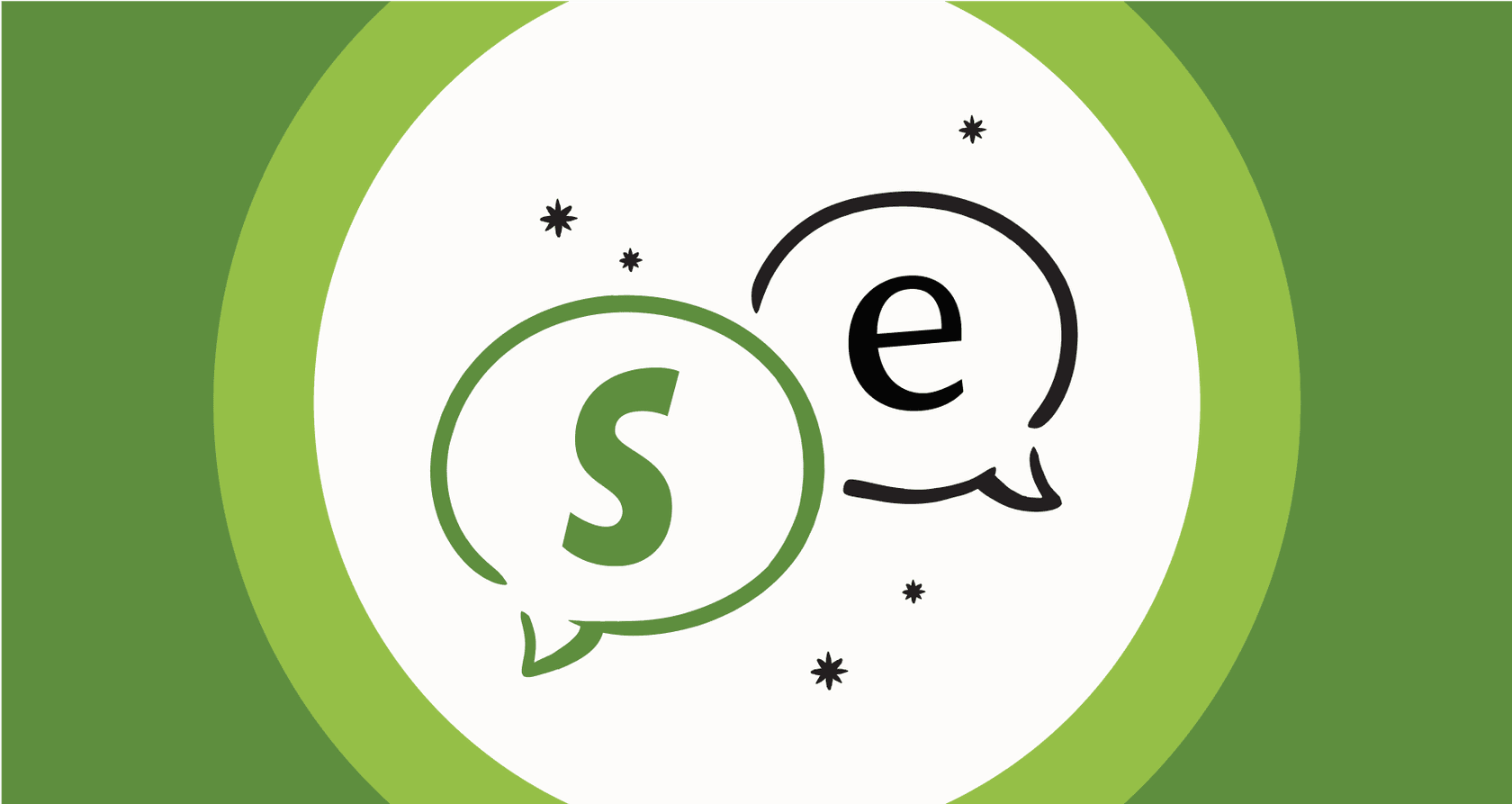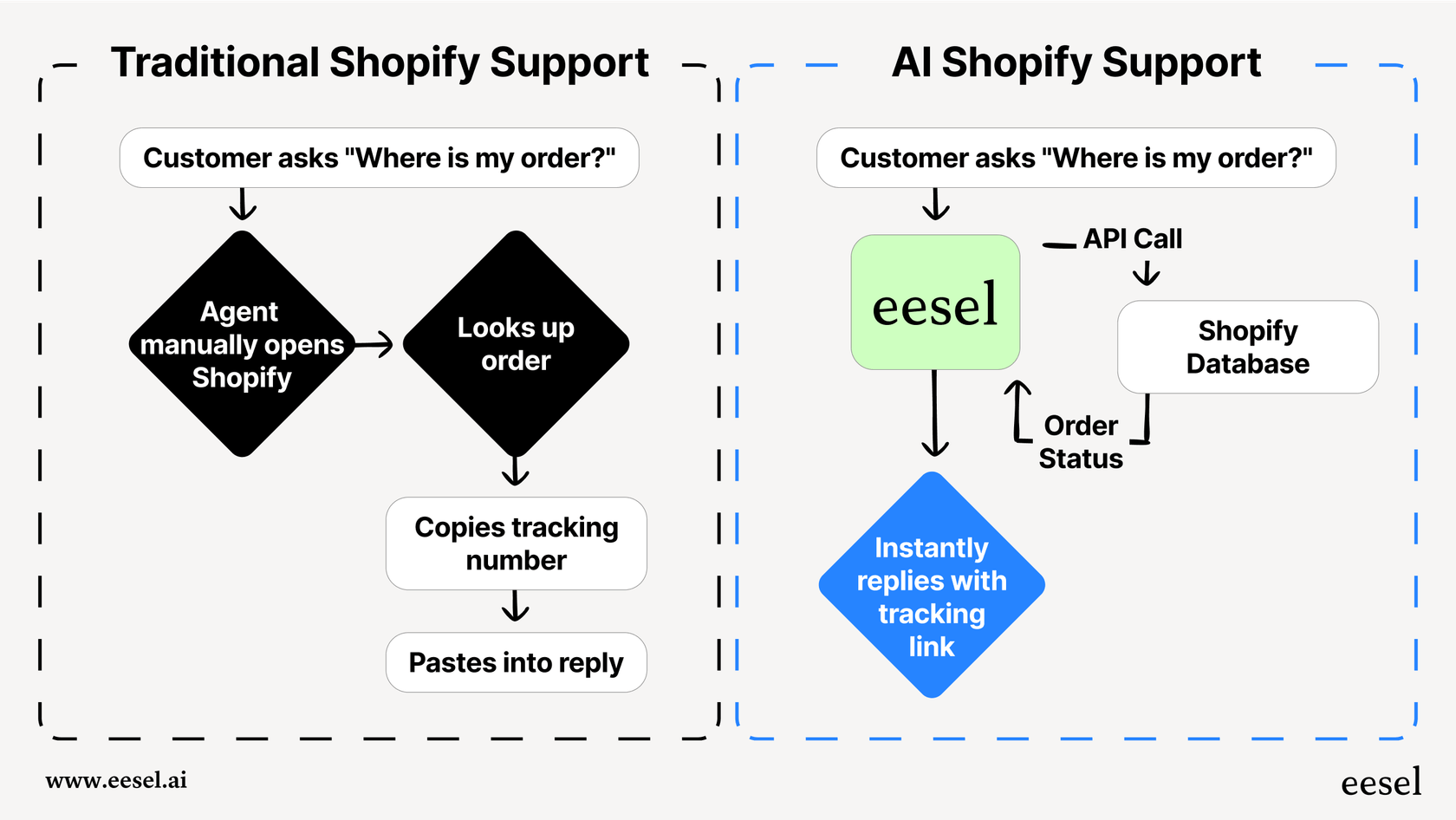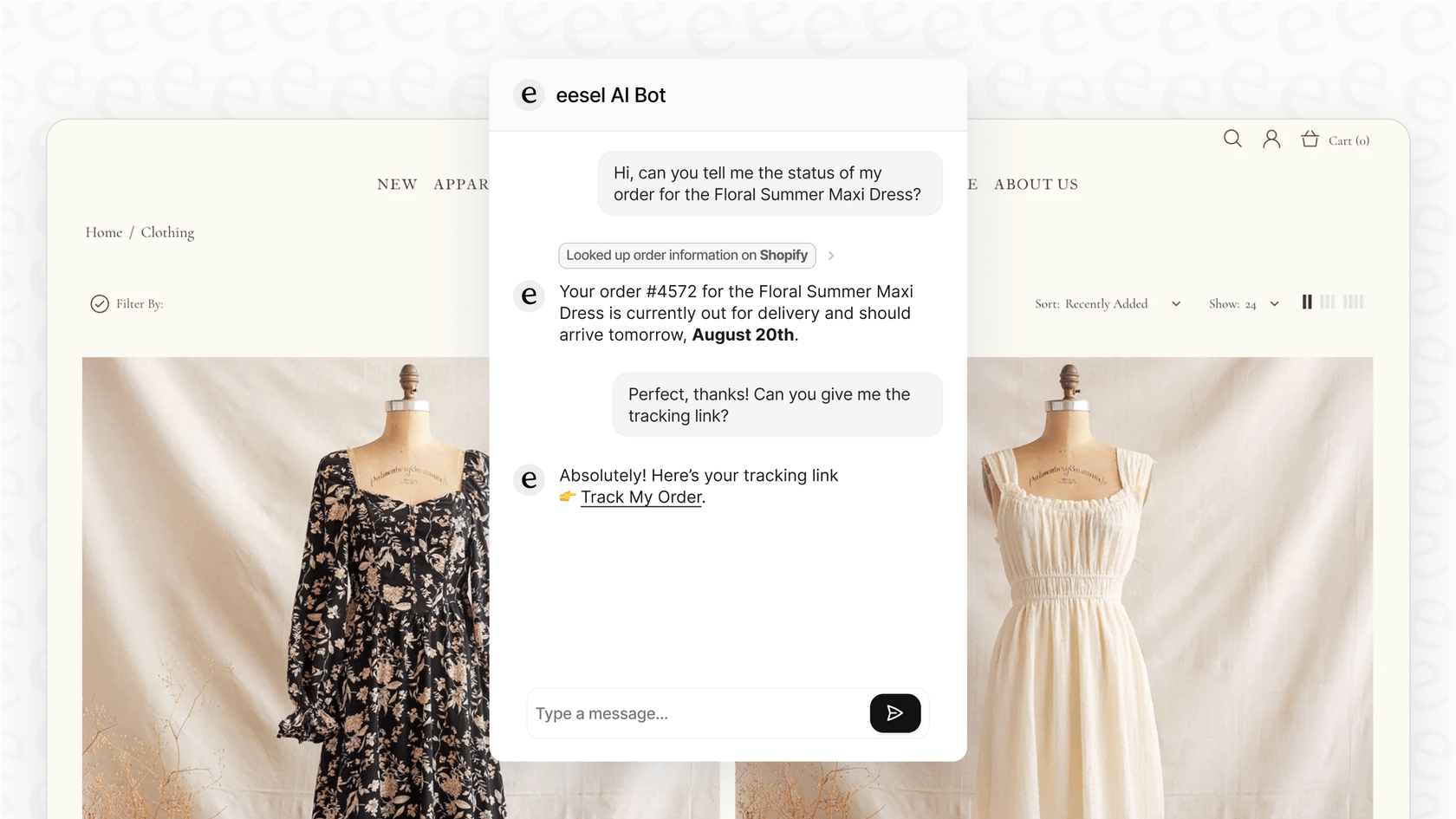A guide to using a Shopify chat to calculate eligibility for free return based on rules

Stevia Putri

Katelin Teen
Last edited October 29, 2025
Expert Verified

Let's be honest, handling returns is probably not your favorite part of running an ecommerce store. While having a good return policy definitely helps people click "buy," the back-and-forth of managing the process can be a real headache for your support team. You're stuck checking order dates, figuring out if a product can even be returned, and explaining the next steps, all while juggling a dozen other customer questions.
But what if you could automate the whole front-end of that process? Picture this: a chat on your Shopify store instantly grabs a customer's order number, checks it against your return policy, and tells them if they qualify for a free return in seconds. No waiting, no manual checks. This guide will walk you through what it takes to get a system like this up and running, from writing clear rules to picking the right tech.

What is a Shopify chat to calculate eligibility for free return based on rules?
In simple terms, a Shopify return eligibility chat is an automated assistant, usually a chatbot, that lives on your website. Its main purpose is to help customers who want to start a return. Instead of having to send an email and wait for your team to get back to them, they can just open the chat and get an immediate answer.
The chat will ask for basic info, like an order number, and then use a set of rules you've defined to see if the product is returnable. These rules are just your store's return policy, broken down into simple steps. For example, it can check things like:
-
Is the customer trying to return this within your 30-day window?
-
Was this a "final sale" item?
-
Is the reason for the return one that gets them a free shipping label?

The simpler versions of these chats just follow a strict script. But the more advanced AI-powered ones can connect right to your Shopify data, understand what customers are asking even when they don't use the "right" words, and can even process the return or suggest an exchange right there in the chat. The goal is to give instant, 24/7 answers to one of the most common questions you get after a sale.
The foundation: A clear return policy
Before any chatbot can do its job, it needs a good rulebook. Your store's return policy is that rulebook. If your policy is confusing or has a lot of gray areas, your chatbot is going to be just as confused. That leads to frustrated customers and more work for your human agents, which is exactly what we're trying to avoid. A solid policy is the starting point for any good automation.
Key parts of a return policy
To set up a Shopify chat to calculate eligibility for a free return based on rules, your policy needs to be super clear on a few things.
-
Return window: Be specific. How many days does a customer have to start a return? "30 days from delivery date" is something a bot can easily check. It's a simple yes or no question: is the request within the window?
-
Item condition: You need to spell out what "returnable condition" actually means. Does the item need to be unworn, in the original box, with tags still on? A bot can't see the item, of course, but it can ask the customer to confirm its condition before moving forward.
-
Eligible products: Make a clear list of what can't be returned. This usually includes things like final sale items, custom-made products, or things that can't be resold. Your bot can then check the customer's order against this "no-fly" list.
-
Refund process: Let people know how they'll get their money back. Is it going back to their credit card, or will they get store credit? If you offer store credit as a perk, the bot can even offer it as a faster, better option.
-
Rules for free returns: This is the big one. What exactly qualifies someone for a free return? Is it only for damaged items? Or maybe it's for any return made within the first two weeks? This clear logic is what allows the bot to make a decision on the spot.
How to implement a Shopify chat for return eligibility
Once your rules are down on paper, it's time to pick the tool that will enforce them. You've got a few different ways to set up a chat on your Shopify store, and each comes with its own set of pros and cons.
Shopify's native features and their limits
Shopify has some built-in tools for managing returns, like its self-serve returns portal. It lets customers log in, pick an order, and request a return. You can even set up basic rules in your admin dashboard, like automatically approving returns that are within your time window.
But this isn't really a "chat." It's more of a form a customer fills out after they've already logged in. It's missing that conversational piece that can quickly answer a question on your main site. The logic is also pretty basic. It can't handle slightly more complex questions, look up whether an item is in stock for an exchange, or tell when a customer is getting annoyed and needs to talk to a person. It's a decent start for basic automation, but it won't handle everything.

Dedicated return management apps
If you search the Shopify App Store, you'll find plenty of third-party apps built just for returns management, like Loop Returns or Return Prime. These tools give you a much more powerful returns portal than Shopify's default option, and they often come with handy features like automated exchange suggestions.
They are great at what they do, but they are also very specialized. They are separate systems focused on one job. They usually can't answer general questions about shipping, and their knowledge is limited to your products and return policy. So if a customer asks, "My return was approved, but where's my new order?" the returns app won't have a clue. The customer will have to open a whole new ticket with your support team.

The all-in-one approach: AI support platforms
Your most powerful and flexible choice is a full-blown AI support platform. Unlike the specialized apps, these platforms are built to handle all kinds of customer service questions, including returns.
This is where a tool like eesel AI really shines. Instead of a rigid, step-by-step returns process, you get an AI agent that connects to all your company knowledge, your help center, past support tickets, internal docs, and, of course, your Shopify store data. This means it can do a lot more than just check a return window. It can:
-
Understand context: It learns from thousands of your past conversations about returns, so it gets the common problems and your brand's voice.
-
Take custom actions: You can set it up to look up live order status, check inventory, or pull customer details directly from Shopify.
-
Offer smarter solutions: If an item is out of stock for an exchange, it can check your help docs to see when it might be back or suggest a similar product.
-
Escalate smoothly: If a question is too tricky, it can pass the conversation over to a human agent with the full chat history, so the customer doesn't have to repeat themselves.
| Feature | Shopify Native Returns | Dedicated Returns App | eesel AI Platform |
|---|---|---|---|
| Conversational Chat | No | Limited | Yes |
| Basic Rule Automation | Yes | Yes | Yes |
| Live Shopify Data Lookup | No | Limited (Exchanges) | Yes (Fully customizable) |
| Handles Other Support Topics | No | No | Yes |
| Learns from Past Tickets | No | No | Yes |
| Setup Time | Minutes | Hours to Days | Minutes |
Pricing a Shopify chat for return eligibility
The cost of automating your Shopify returns can really swing depending on the tool you pick. It’s important to look past the monthly fee and think about the total value you're getting.
Pricing for dedicated returns apps (e.g., Loop Returns)
A lot of returns apps base their pricing on how many returns you process. For example, a popular tool like Loop prices its plans based on your return volume. You'll have to chat with their sales team for exact numbers, but the more returns you have, the more you pay.
That sounds simple enough, but it means your costs go up right alongside your returns, which can be hard to predict during the holidays or after a big sale. You're also paying for a tool that does one thing and one thing only: returns.
Pricing for an AI platform: eesel AI
AI platforms like eesel AI have a different pricing model that gives you a lot more bang for your buck. Instead of paying per return, plans are based on the number of "AI interactions" per month. An interaction is any task the AI does, whether that’s answering a question, sorting a ticket, or, yes, processing a return.
-
Team Plan: $299/month for up to 1,000 monthly AI interactions.
-
Business Plan: $799/month for up to 3,000 monthly AI interactions, plus cool features like training on your past tickets and custom actions for Shopify lookups.
-
Custom Plan: For bigger companies that need unlimited interactions.
The real win here is the value and predictability. For one flat price, you get an AI agent that handles returns and all your other common support questions. There are no per-resolution fees, so you won't get a surprise bill after a busy month. You get a whole AI support toolkit, including an AI Agent, a Copilot for your team, and AI Triage, for a predictable cost.
A Shopify chat for return eligibility is more than a workflow
Setting up a Shopify chat to calculate eligibility for a free return based on rules is a fantastic way to give your support team their time back and give your customers the instant answers they've come to expect.
It all starts with a crystal-clear return policy that doesn't leave anything up for interpretation. That’s the instruction manual your automation will use. And while Shopify’s own tools and dedicated returns apps can handle simple workflows, they often work in their own little bubble, which can be frustrating for customers who have other questions.
A complete AI support platform like eesel AI offers a smarter, more connected solution. By pulling from all your knowledge sources and plugging directly into your Shopify store, it can handle tricky return situations, suggest helpful alternatives, and manage a ton of other support queries. The best part? You can get started in a few minutes, see how it would have performed on your past tickets to build some confidence, and then roll it out at your own pace.
Ready to see how an AI agent could change your Shopify returns game? Try eesel AI for free and build your first AI agent in minutes.
Frequently asked questions
It's an automated assistant, typically a chatbot, on your Shopify store that instantly determines if a customer qualifies for a free return. It asks for basic order information and checks it against your pre-defined return policy rules, providing an immediate answer without manual intervention.
Implementing this system significantly reduces the manual workload for your support team, freeing them from repetitive checks and allowing them to focus on more complex issues. It also enhances customer satisfaction by offering instant, 24/7 answers to return eligibility questions, improving their overall experience.
The most crucial step is having a crystal-clear, well-defined return policy. This policy acts as the "rulebook" for your chat, ensuring it can make accurate and consistent decisions regarding eligibility. Ambiguous policies will lead to frustrated customers and increased human agent involvement.
It can check specific criteria such as the return window (e.g., within 30 days of delivery), whether the item is a "final sale" product, or if the reason for return qualifies for free shipping. More advanced systems can also prompt customers to confirm item condition.
You can use Shopify's native self-serve portal for basic automation, dedicated third-party return management apps for more features, or a full-blown AI support platform like eesel AI. AI platforms offer the most flexibility, handling returns alongside other support queries.
While specialized apps focus solely on returns, advanced AI support platforms can handle a wide range of customer service questions. These platforms connect to all your knowledge bases, allowing them to answer queries about shipping, product information, order status, and more, providing a unified support experience.
Dedicated return apps often charge based on the number of returns processed, leading to variable costs. AI platforms like eesel AI typically price based on monthly "AI interactions," providing a predictable flat fee for handling returns and all other customer inquiries, offering broader value.
Share this post

Article by
Stevia Putri
Stevia Putri is a marketing generalist at eesel AI, where she helps turn powerful AI tools into stories that resonate. She’s driven by curiosity, clarity, and the human side of technology.





